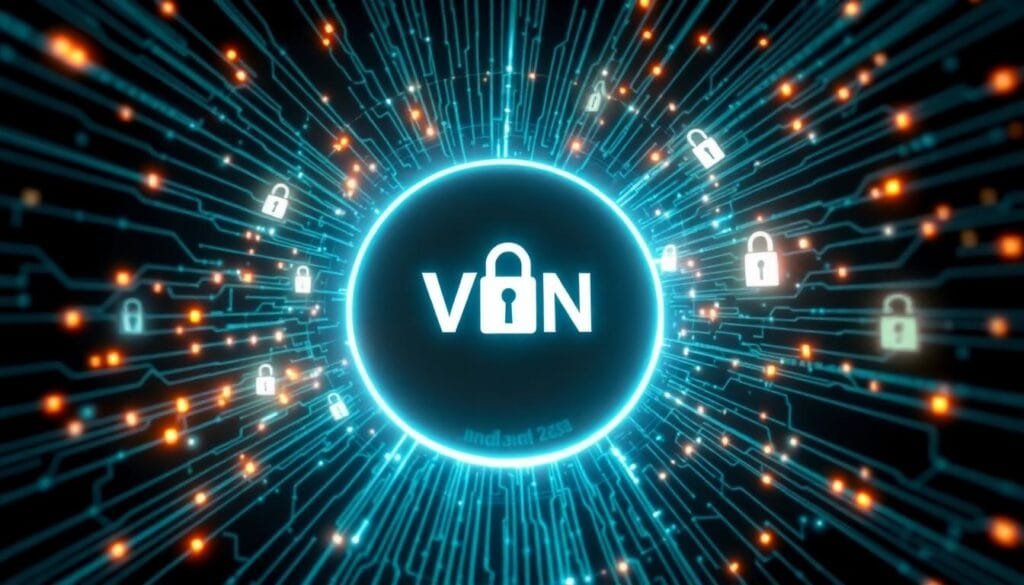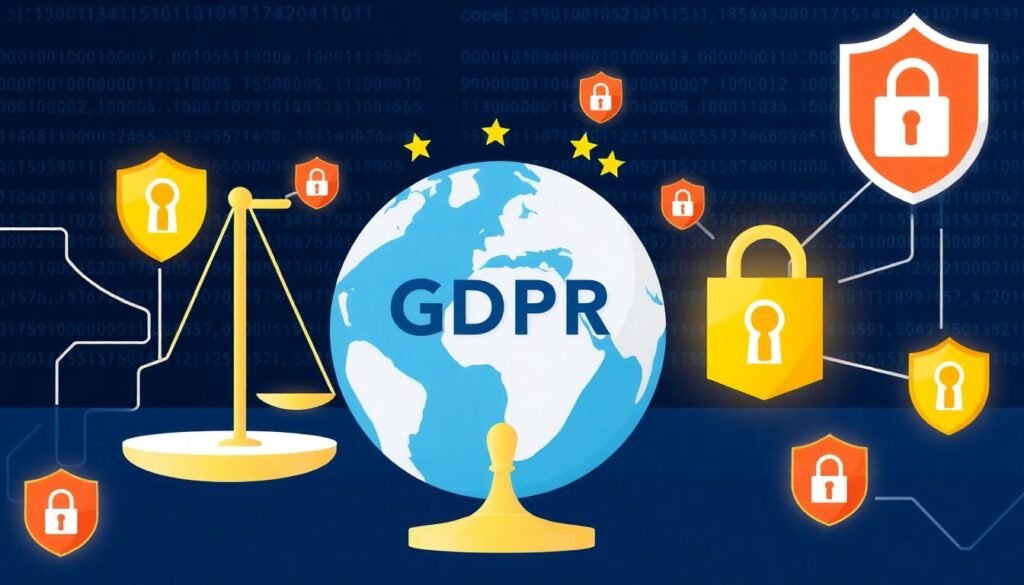Protecting personal data has become necessary in today’s interconnected environment. GDPR regulations and VPN technology form two critical parts of the privacy equation. This guide examines how these elements work together to create effective data protection systems.
How VPNs Support GDPR Compliance in Practice

VPNs create encrypted tunnels for internet traffic, naturally supporting GDPR’s core principles. This encryption transforms a standard connection into a privacy-focused environment where data stays protected from unauthorized access.
When you connect through a VPN, your information gets wrapped in multiple layers of encryption. This process directly supports GDPR’s Article 32 requirement for “appropriate technical measures” to ensure data security. For organizations handling EU citizens’ data, implementing VPN protocols represents a practical step toward compliance.
Encryption: The Foundation of Data Protection
GDPR requires businesses to implement “appropriate security” for personal data. VPNs provide this through strong encryption standards like AES-256, which creates secure protection during data transmission.
Consider what happens when employees access company databases remotely. Without a VPN, sensitive information travels across networks in a potentially exposed state. With a properly configured VPN, that same data moves through an encrypted tunnel that shields it from interception.
Research from cybersecurity firm CheckPoint confirms organizations using VPNs experience approximately 30% fewer successful data breaches compared to those without similar protection systems[1].
Anonymous Browsing and Data Minimization

Data minimization is central to GDPR compliance, requiring organizations to collect only essential information. VPNs support this principle by masking IP addresses and reducing identifiable digital traces.
When a user connects through a VPN:
- Their actual IP address remains hidden
- Their geographic location appears changed
- Their browsing patterns become more difficult to track
This anonymization directly supports Article 5 of GDPR, which requires personal data to be “limited to what is necessary.” By reducing traceable information created during online activities, VPNs help organizations maintain smaller, more manageable data collections.
Compliance Challenges for VPN Providers Under GDPR

While VPNs facilitate GDPR compliance, the providers themselves face specific challenges in meeting regulatory requirements. These challenges stem from the nature of their service – handling potentially sensitive user data while maintaining privacy.
Logging Policies and Breach Notification Requirements
GDPR mandates strict breach reporting within 72 hours – a significant challenge for service providers. For VPN companies, this creates a careful balance between:
- Maintaining minimal logs to protect user privacy
- Keeping sufficient records to detect and report breaches
- Developing systems that can identify incidents quickly
Some providers have responded with “no-logs” policies, which require careful implementation and regular independent audits to verify. Others maintain limited logs with enhanced security controls to balance compliance needs with privacy commitments.
Cross-Border Data Transfer Considerations
VPN services operate globally, but GDPR imposes specific requirements on data transfers outside the EU. Providers must implement legal mechanisms like Standard Contractual Clauses to legitimize these transfers.
For instance, when a European user connects to a VPN server in Asia, their data crosses multiple jurisdictional boundaries. VPN providers must ensure this process complies with GDPR’s Chapter 5 provisions on international transfers, often by implementing additional safeguards beyond encryption alone.
Benefits GDPR Brings to the VPN Ecosystem
Despite implementation challenges, GDPR has positively transformed the VPN industry by establishing clear privacy expectations and encouraging better practices.
Building User Trust Through Transparency
GDPR’s emphasis on clear privacy policies has pushed VPN providers to communicate more openly about their data practices. This transparency helps users make informed choices and builds trust in services that prioritize privacy.
Users now expect detailed information about:
- What data is collected
- How long it’s retained
- Who has access to it
- How it’s protected
VPN providers with comprehensive, readable privacy policies generally see higher user retention rates as privacy awareness grows among consumers.
The Global Impact of Privacy Standards

Though GDPR specifically protects EU residents, its influence extends worldwide. Many VPN providers now apply GDPR-level protections to all users regardless of location, creating a practical global standard for data handling.
This harmonization benefits users everywhere and simplifies compliance for providers who can implement consistent privacy frameworks rather than region-specific solutions. As more countries develop privacy regulations, GDPR-compliant VPNs find themselves already prepared for these emerging requirements.
Implementing VPNs as Part of Your GDPR Compliance Strategy
Organizations seeking GDPR compliance should view VPNs as valuable components in their broader privacy framework. When properly implemented, VPNs address several compliance requirements simultaneously.
For remote workforces, VPNs protect data during transmission between home networks and company systems. This protection becomes increasingly important as work-from-home arrangements become standard for many organizations.
IT departments should evaluate potential VPN solutions based on:
- Encryption standards used
- Authentication methods
- Logging policies
- Performance under high traffic conditions
- Compatibility with existing security systems
VPNs function as one layer in a comprehensive data protection strategy. They work effectively when combined with other measures like access controls, data minimization practices, and regular security assessments.
The relationship between VPNs and GDPR shows how technical tools and regulatory frameworks can strengthen each other in building better privacy protections. As privacy regulations continue evolving globally, this connection between technology and policy will shape how organizations approach data security. Understanding this interaction helps businesses and individuals make more informed decisions about protecting their digital information.
What privacy tools do you currently use alongside VPNs to protect your data? Have you noticed changes in how companies communicate their privacy practices since GDPR took effect?

FAQ’s:
❓ How do VPNs specifically help with the “right to be forgotten” under GDPR? (Click to Expand)
▶ VPNs support the right to be forgotten by reducing the digital footprint that organizations collect. By anonymizing user activity, VPNs limit the personal data that companies can gather, making deletion requests more manageable and comprehensive.
❓ Can a VPN provider refuse service to maintain GDPR compliance?
▶ Yes, VPN providers may refuse service when they cannot guarantee GDPR compliance, such as when serving users from regions under international sanctions or when unable to implement appropriate safeguards for data transfers.
❓ Do free VPNs meet GDPR requirements?
▶ Many free VPNs fail to meet GDPR standards because their business models often rely on collecting and monetizing user data. Premium VPNs with transparent privacy policies typically offer stronger GDPR alignment through proper funding for compliance measures.
❓ How often should businesses audit their VPN security for GDPR compliance?
▶ Businesses should conduct VPN security audits at least annually, with additional reviews following infrastructure changes, security incidents, or updates to GDPR guidance from regulatory authorities.
❓ What documentation should companies maintain about their VPN usage for GDPR purposes?
▶ Organizations should maintain documentation including risk assessments, implementation details, maintenance procedures, access controls, and incident response plans related to their VPN infrastructure to demonstrate accountability under GDPR.
The Pickary Hub may contain affiliate links from which we may earn a commission, though this will never result in additional costs for users who click these links.
[1] CheckPoint Security Research, “Virtual Private Networks and Data Security Compliance,” 2023.






